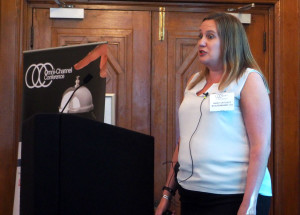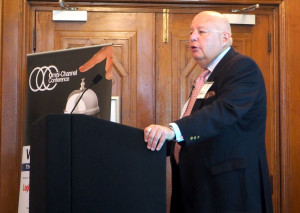Demographic change has been a key factor in the development of online shopping over the past few years, and in a keynote address at the Omni-Channel Conference, Mandy Critchley, director of brand partnerships at mySupermarket, highlighted the impact of demographics on the future market.

There has been a trend in grocery for consumers to research online even if they mean to buy in store. She identified a key period between researching and buying – typically two days. And of those that go on to buy, some 35 per cent buy offline and 65 per cent online.
Critchley pointed out that 40 per cent of products are on promotion at any one time, and increasingly consumers understand that they need to keep on top of that.
And she pointed out that the knowledge gained from seeing what shoppers are doing online can be used to improve the understanding of buying patterns.
She gave the example of click stream analysis to see which day of the week shoppers are buying particular products. For example, research shows that spirits tend to be bought on Thursdays while coffee is bought on Mondays.
Critchley said that it is also important to look at what else is likely to be in a shopper’s basket, as this gives retailers insight into the shopper’s process.
Critchley also pointed out that unlike in-store shopping, online is not a linear process – there are many different ways to get to a category. Understanding how the shopper has got to the point of purchase is important.
Looking ahead, she said retailers needed to understand how the shopper has changed and find better ways to group products to attract shoppers.
She highlighted the importance of the omni-channel path – identifying how retailers can follow shoppers over path to purchase, and identify and target shoppers anywhere, on any device. By building segments of those shoppers – retailers can target with their messages over two days of buying process.
David Grant – Chairman

The conference, in London on 28th and 29th September, is chaired by David Grant, professor of logistics at the University of Hull and distinguished senior fellow at Hanken School of Economics, Helsinki.
Grant’s research encompasses logistics customer service, satisfaction and service quality; retail logistics; and reverse, closed-loop and sustainable logistics. His business experience includes retail, corporate banking, technical design and consulting.
Mapping the customer journey
Kelly McKnight, head of trends at Join the Dots, provided an insight into how to map the customer’s purchasing journey and how retailers can adapt their strategy.
UK shoppers buy more online per head than other developed countries, she said, and in part this is cultural: “We are quite hedonistic as a country,” she said, and went on to point out that time not money is the 21st century’s most precious commodity.
McKnight highlighted the importance of the concept of “hedonic expectation” and said people’s expectation of time are changing. There has been a redistribution of how we use time, and we are cramming more in.
At the same time, following the recession, people are now more willing to spend and engage more with brands. They are looking for brands to enhance their experiences.
She pointed to research that showed 89 per cent feel “ it’s important to have fun and enjoy life now while times are good”. “Omni-channel can help with best use of time,” said McKnight.
Looking ahead, she highlighted the theme of “Future Uncertainty”. We are out of recession but there is a lot of uncertainty across the world – including Brexit, the US presidential election, the migrant crisis, terrorism, as well as other uncertainties.
In response, she said, people want to control their immediate environment and block out the wider world. What people want is to escape, to immerse themselves in their own private world. People also want to slow down, live in the now, and revel in what they have got at the moment. This means that people want to do the mundane things faster so that they can enjoy other things at leisure.
Social Media
The use of social media was examined by Ian Irving, founder and creative strategy director of Kemosabe, who is recognised as one of the founding leaders of ‘Experiential’ marketing in the UK.
He pointed out that consumer behaviour is changing so fast that brand and agencies struggle to keep up. The gap between the live environment and the digital environment is becoming more and more blurred, he said, and suggested that we should be talking in terms of the “Phygital” – merging of physical and digital world. “If you don’t have a multi-platform sales strategy – you don’t have a sales strategy.”
You must assume nothing he said, arguing that traditional demographics is becoming out of date – what is needed is a shift towards the “Psychographic” – dividing market into segments by personality trails, values attitudes interests and lifestyles. He also said it is important to understand influences and passions, and that this is key to engagement and deeper relationships with consumers which should result in repeat business.






